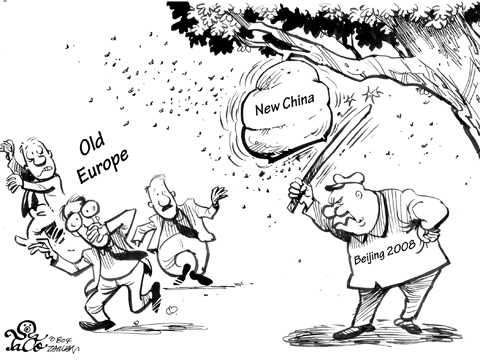¡@
Beijing
starts new `patriotic' education campaign in Tibet
AGENCIES, BEIJING AND WASHINGTON
Tuesday, Apr 22, 2008, Page 1
China has launched a campaign in Tibet to denounce the Dalai Lama and to
strengthen ties between the public and the Chinese Communist Party (CCP), the
Tibet Daily reported yesterday.
The two-month ¡§patriotic education¡¨ will cover the capital Lhasa and surrounding
rural areas and will focus on strengthening relations between Tibetans and local
CCP officials, the newspaper said.
Group education sessions will be held to unify their thinking and ¡§deepen¡¨ the
struggle against independence forces and hit back at the ¡§Dalai clique¡¦s
splittist plots,¡¨ it said.
China has stepped up so-called ¡§patriotic campaigns¡¨ in monasteries in Tibet
requiring Tibetan Buddhist monks to denounce the Dalai Lama and declare their
loyalty to Beijing.
In place for more than a decade, the campaigns are believed to have fueled
recent protests by monks in Tibet and other Tibetan areas of China that broke
out on the anniversary of a failed 1959 uprising.
The new campaign is called ¡§Oppose splittism, Protect stability, Encourage
development¡¨ the newspaper said.
CCP members will educate rural people about the truth of the March 14 riots, the
paper said. They will use video and pictures, invite those who were involved in
the riots to talk and will also hold denunciation sessions, it said.
Meanwhile, US Undersecretary of State Paula Dobriansky yesterday reiterated a US
appeal for dialogue between the Chinese government and the Dalai Lama, saying it
was ¡§the only viable way forward¡¨ to resolve the issue of Tibet.
Dobriansky was also scheduled to meet yesterday with the Dalai Lama.
¡§President [George W.] Bush has repeatedly expressed his own steadfast support
for dialogue between the Dalai Lama and China¡¦s leadership,¡¨ Dobriansky wrote in
the Washington Post. ¡§Meaningful dialogue presents the only viable way forward.¡¨
Dobriansky said the best way for China¡¦s leaders to address Tibetan concerns is
to engage in dialogue with the Dalai Lama.
¡§The Dalai Lama is the only person with the influence and credibility to
persuade Tibetans to eschew violence and accept a genuine autonomy within China
that would also preserve Tibetan culture and identity,¡¨ she wrote.
She also demanded that China cease repressive measures directed at Tibetans
seeking to practice their religion, preserve their cultural identity and release
those detained for peacefully expressing their views.
In related news, China mounted a stern defense of its human-rights record
yesterday, accusing Western countries of ignoring problems of their own and
having double standards.
Luo Haocai (ù»¨¤~), deputy head of a largely ceremonial top government advisory
body and in charge of the government affiliated China Society for Human Rights
Studies, said China had made ¡§huge strides¡¨ in improving human rights.
¡§Chinese citizens¡¦ rights and political rights are fully guaranteed,¡¨ he told a
forum in Beijing, according to a transcript of his remarks. ¡§Chinese people
enjoy unprecedented freedom of every kind and basic human rights, including
freedom of religious belief and the right to political assembly.¡¨
¡@
¡@
Chinese
student in US threatened over protest
AGENCIES, WASHINGTON
Tuesday, Apr 22, 2008, Page 4
¡@
|
|
| A neighbor
walks past graffiti saying ¡§Kill everyone in the home¡¨ and ¡§Kill
traitors¡¨ outside the family home of Chinese student Grace Wang in
Qingdao, China, yesterday.
|
¡@
A Chinese woman studying in the US says she has become the
victim of threats and intimidation for her role during a recent campus protest
against China¡¦s crackdown in Tibet.
¡§Trying to mediate between Chinese and pro-Tibetan campus protesters, I was
caught in the middle and vilified and threatened by the Chinese,¡¨ Grace Wang
(¤ý¤d·½), a student at Duke University in Durham, North Carolina, wrote in the
Washington Post on Sunday.
Wang, from the eastern Chinese city of Qingdao, had tried to mediate in a small
demonstration between pro-Tibet and pro-China students at Duke University, where
she is an undergraduate.
When she then wrote a letter to the university¡¦s Chinese students¡¦ association
explaining her actions, it opened the floodgates to angry denunciations of her
for apparently siding with the Tibetan cause.
Wang wrote that while trying to mediate between some pro-Tibet protesters and a
larger gathering of pro-China students on April 9, tempers became so inflamed
that she was nearly attacked by fellow Chinese students.
¡§The Chinese protesters thought that, being Chinese, I should be on their side,¡¨
she said. ¡§It started to feel as though an angry mob was about to attack me,¡¨
wrote Wang, who said she was forced to leave the protest ¡§with a police escort.¡¨
She later became the victim of online ¡§intimidation¡¨ by fellow students at Duke
who deemed her a ¡§traitor¡¨ to her country, as well as threatening phone calls.
¡§It has been a frightening and unsettling experience,¡¨ she wrote.
Nevertheless, Wang, who continues to receive police protection on the Duke
campus, said she remains ¡§determined to speak out, even in the face of threats
and abuse.¡¨
¡§If I stay silent,¡¨ she wrote, ¡§then the same thing will happen to someone else
someday.¡¨
Wang said that detailed instructions to her parents¡¦ house had appeared on-line,
feces had been emptied on the doorstep and her high school had revoked her
diploma.
¡§It was ironic: What I had tried so hard to prevent was precisely what had come
to pass. And I was the target,¡¨ Wang wrote.
Her only intention was the get the two sides at the protest to talk to each
other, she said.
¡@
¡@

¡@